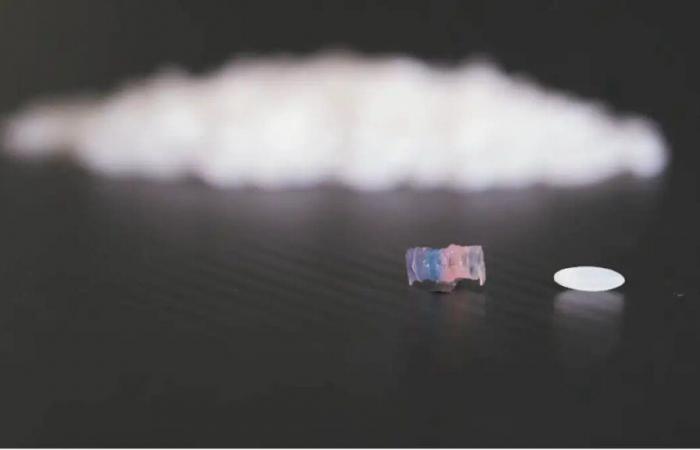Precise drug delivery constitutes one of the greatest contemporary therapeutic challenges. The non-targeted distribution of active substances considerably limits the effectiveness of treatments while increasing the number of undesirable effects. A major innovation has just been presented by researchers in Singapore, revealing new therapeutic possibilities.
The laboratories of the School of Mechanical and Aerospace Engineering (MAE) have developed microscopic soft robotswhich is controlled by magnetic fields. The study, published in Advanced Materials, presents the first generation of miniaturized robots with the ability to transport up to four different medicationsreleased according to programmable sequences and dosages.
«The results demonstrate the considerable potential of our soft robots in targeted drug delivery, particularly for treatments requiring precise control of multiple substances.» said Dr. Yang Zilin of Nanyang Technological University.
A biocompatible technological feat
The design of micro-robots is based on the use of intelligent magnetic composite materials. The combination of magnetic microparticles and polymers guarantees total safety for the body. The exceptional dexterity of the devices allows them to be propelled and guided precisely around obstacles, an essential feature for navigation in complex anatomical environments.
Laboratory tests revealed remarkable performance. Movements are carried out at speeds between 0.30 mm and 16.5 mm per secondallowing precise release of different medicinal substances in targeted areas. Extended testing validated the ability to maintain controlled diffusion for eight hours, with drug leakage reduced to a minimum.
Towards high precision medicine
« These results show that our soft robot could potentially play a key role in the future of targeted drug delivery, particularly in treatments such as cancer therapies that require precise control of multiple drugs ” said Mr. Yang.
Providing an independent perspective, Dr Yeo Leong Litt Leonard, senior consultant surgeon at the National University Hospital of Singapore, analyzed: “ As a doctor who performs minimally invasive procedures, we currently use a catheter and wire to move through the blood vessels to treat problems. But I can foresee that it won’t be long before this is replaced by tiny robots that can swim autonomously within the body to reach places we can’t reach with our tools. These robots could stay in place and release drugs over time, which would be much safer than leaving a catheter or stent inside the body for a long time. This is a medical breakthrough about to happen ».
The NTU teams are currently continuing their miniaturization work. The targeted applications concern in particular the processing of brain tumorsbladder and colorectal cancers. In-depth evaluations on organ-on-a-chip and animal models will precede the clinical application phase.



Illustration caption: Developed by a team of scientists from #NTUsg, this new #softrobot – the size of a grain of rice – can be controlled by magnetic fields and transport up to four different types of drugs. This allows for more precise control of delivery and doses delivered to patients, which can improve therapeutic outcomes and lead to further biomedical advances.
Article : « Magnetic Miniature Soft Robot with Reprogrammable Drug-Dispensing Functionalities: Toward Advanced Targeted Combination Therapy » dans Advanced Materials – DOI : 10.1002/adma.202408750






